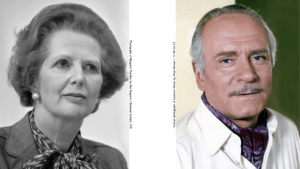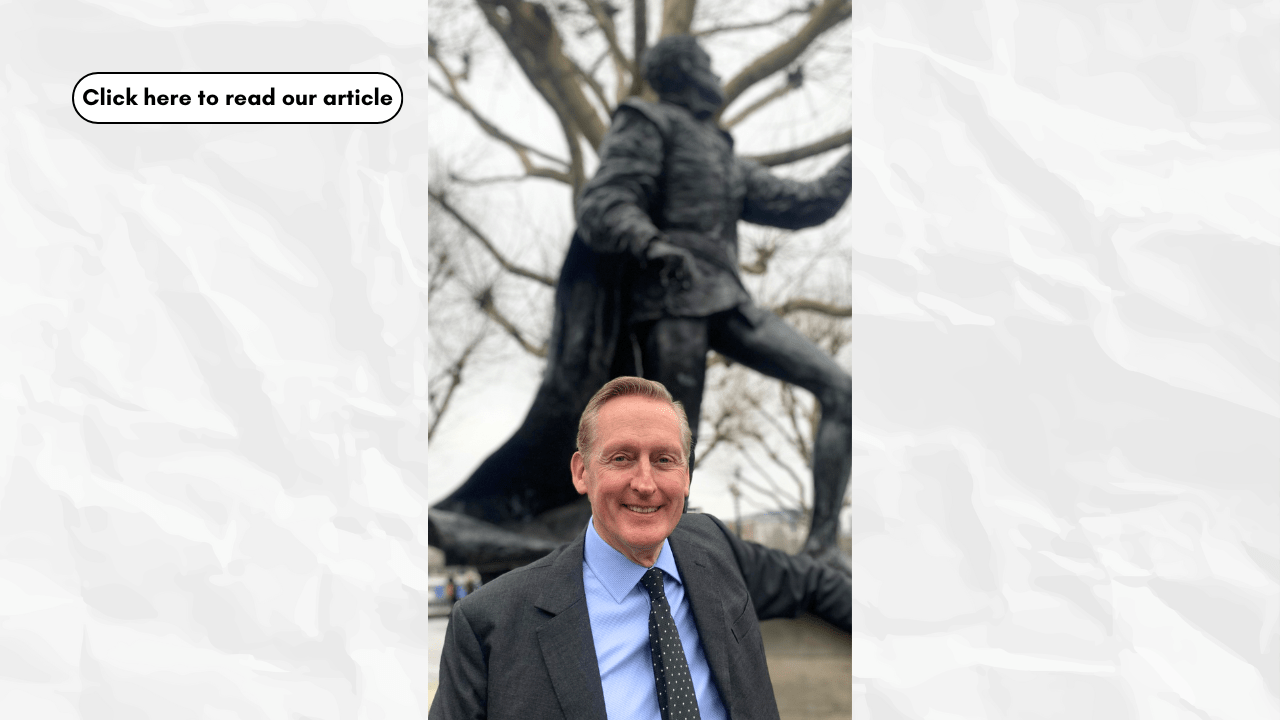The revelation that Keir Starmer has been taking presentational advice from the former Royal Shakespeare Company actress Leonie Messenger has brought into sharp focus the help that some politicians feel they need from professional performers. Tim Walker’s latest play When Maggie Met Larry raises some interesting questions about whether politicians can ever really be entirely themselves in the television and social media age. I met with the playwright to ask him about When Maggie Met Larry, his views about the importance of performance in politics and future plays.
Your latest play When Maggie Met Larry is going to be broadcast on BBC Radio Four and the BBC Sounds App at 3pm today (Saturday February 15). What’s the premise?
It’s the story of how Margaret Thatcher went to Laurence Olivier – the greatest actor of his generation – to get presentational advice ahead of becoming prime minister. It is in the public domain that Olivier helped her, but not what transpired between them. This play, being broadcast to coincide with the 50th anniversary of Mrs Thatcher becoming leader of the Conservative Party, imagines what happened when they got together.
What’s the play’s message?
Well, I think it is a lot of fun, and I was thrilled that The Observer’s critic Stephanie Billen described it in her review last weekend as ‘a laugh-out-loud production.’ In terms of the messaging – and Stephanie picked up on this, too – I guess it is how politics is now often more about performance than substance. Look at Johnson and now Trump – these people are first and foremost showmen. I don’t think it’s over-stating it to say what Olivier did for Thatcher was a game-changer: certainly, the Thatcher that emerged from Olivier’s tutelage was very different to the Thatcher that went before. Labour then realised they had to work on their act, too. I really do wonder now if politicians can ever really be themselves in the age of television and social media.
Sir Derek Jacobi plays Olivier and Frances Barber is Thatcher. What was it like working with them?
Frances is an old friend and an actress I admire very much. I caught a re-run of Film Stars Don’t Die in Liverpool the other night, and, while it’s a short scene she has in that, she is absolutely mesmerising. That’s just typical of Frances – she always makes the most of everything. So I knew her Thatcher would be something special, and, trust me, she doesn’t disappoint. As for Derek, he gives the play a special gravitas not just because he is Derek but because he is himself a protégé of Olivier and knew him well. Derek is a kind, decent, very modest man, but also a total professional. It’s not normal to rehearse radio plays, but he was adamant that we should all gather at his home in north London and run through it over a few days. There is not a word or intonation in the play we didn’t all think through and discuss very carefully.
Would you say this is a political play?
Politically it is a neutral play. It is not right wing or left wing. It is only making a point about what has happened to politics generally. Labour under Neil Kinnock understood what they had to do when they saw what Olivier had done with Thatcher and they had their ‘red rose’ rebrand, their conferences became more geared to what the television cameras wanted, and they drafted in people like Hugh Hudson – the Chariots of Fire director – to help with a campaign ad. Ronald Reagan’s subsequent election in America I saw as the consummation of the relationship between the worlds of acting and politics.
Is Keir Starmer what you would call a showman?
If it’s true the former RSC actress Leonie Mellinger has been his voice coach, I fail to see she’s made any discernible difference. He seems to me a bit of a throwback to the days of rather stodgy politicians like Jim Callaghan. It will be interesting to see if the Tories put up a show man – or woman – against him come the next election. Kemi Badenoch clearly isn’t that, any more than Starmer is. I might add I don’t believe – and I don’t say in the play – that having politicians who are also actors is a good thing. Indeed, Thatcher in the play wonders out loud if it isn’t all very dishonest. But sadly I think as viewers a lot of us have got to the point we find it very difficult to distinguish between Coronation Street and Downing Street so politicians now feel they have to perform.

This is your second play?
My first was Bloody Difficult Women which had an extended run at the Riverside Studios in London before transferring to the Edinburgh Fringe where it was also a sell-out. I think that play did, by contrast, have a political message in that it was specifically about Brexit. It was very much about how newspapers – the Daily Mail in particular – essentially drove the whole debate around Brexit and their fury when one very brave woman in Gina Miller dared to stand up for the law and due process. What I enjoyed most of all about putting on that play was that it turned into a nightly party for progressive minds – theatre people like Ian McKellen, Bill Kenwright, Michael Grandage, Frances Barber, Jenny Seagrove and Ben Kingsley came to see it; lawyers such as Baroness Hale and Lord Pannick; journalists Tina Brown, Geordie Greig, Kevin Maguire, Adam Boulton, Sangita Myska, Fatima Manji, Alastair Campbell and Michael Cockerell; and political figures such as John Bercow, Rupa Huq, Baronesses Hussein-Ece and Campbell, among so many others. I felt some nights when it was running at the Riverside like it was the Algonquin club-on-Thames.
You dared to be overtly critical of every media group in that play?
Yes, my late, great friend Bill Kenwright said to me, ‘well, you’ve got guts, lad, but if you’re going to attack the press, don’t expect them to be kind to you in their reviews.’ As a matter of fact, we got some good reviews from right-wing outlets such as the Spectator, and, even though we had dared to commit the blasphemy of putting Paul Dacre – the editor-in-chief of the Daily Mail – on to the stage, we got what I would describe as a gracious and good-humoured review out of them. I have to say I admired them for that. Only my old paper the Daily Telegraph pretended that play never happened. Still, all the actors seemed to care about was what Michael Billington made of it and them, and, thankfully, he was very positive and encouraging.
Do you miss your days in newspapers?
The newspaper industry was the love of my life, but I can see it has changed – it isn’t resourced in the way it was in my day, the journalists aren’t having the kind of fun they once had and all they seem to do is comment on what’s happening, rather than breaking big stories. I also think it has got very corrupt. Maybe it has always been corrupt, but it has got a lot worse lately. I see a lot of financial journalists going easy on certain companies – maybe even puffing them shamelessly – and then, with a certain wearying predictability, going on to take director of communications-type jobs with them. Political journalists are doing the same with specific parties and politicians, and I see that, too, to an extent, in sports journalism. I guess they just don’t see journalism as a secure job for life and are trying to put in contingency measures.
Do you regret not starting to write plays earlier in your life?
No, not at all, as I think if I had started in my twenties, I’d have written very embarrassing plays. If I had my way, no one should be allowed to write a play until they are at least 50. You acquire a greater emotional literacy as you get older and you understand the world a lot better. Certainly it’s only now I am getting on a bit myself I can write about a character like Olivier as I understand a bit more about how you feel as you get older. If I have a formula for writing a script, it’s come up with a good, strong idea that people will go for, keep to the basic facts, but then try to use the script as a way of sharing with people what you have learnt in your own life.
What else have you done since you left the Telegraph?
Frances Barber said to me it was the best thing I ever did when I left that paper, and she’s right, it has turned out to be an adventure. I worked for Gina Miller, helping her out with crisis comms, which was tremendous fun, even if it did feel a bit like defending Rorke’s Drift, given the hostility of the Tory press to her. I also stood briefly as the Lib Dem parliamentary candidate in Canterbury in the election before last, but, somewhat controversially, ended up saying ‘vote Labour’ as I could see I would only end up dividing the progressive vote in the constituency. And I published a book of interviews I had done with actors that was called Star Turns – still available on Amazon.
Some playwrights I have got to know well are quite happy with the solitariness of writing plays full-time – the late Ronnie Harwood was a good example of that and so is Alistair Beaton, a good friend of mine who has also written some brilliant plays – but I find I enjoy public relations work too which is another artform in its own way and it gets me out of the house and helps to pay the bills. Personally, I find it helpful to be around revolving groups of people of all ages and backgrounds as you get ideas and you hear people say things that would make good lines. I have also given quite a bit of media training with senior executives and politicians in my time and that of course has helped to inform When Maggie Met Larry.
How is writing plays different from journalism?
Similar in some ways, different in others. In journalism the important thing was what we called the intro – the first paragraph – as that was what would draw the reader in and make him or her read the story. In the age of Neflix, where we all sit in front of the TV starting a film or whatever and getting bored and clicking on something else, it’s just the same. So I made sure When Maggie Met Larry started off strongly, if not actually explosively. The difference is that in journalism you have to obsess all the time about the facts – at least that was what it was like in my day – and in drama you have got to let a lot of that go. Like in When Maggie Met Larry, I have Maggie meeting Larry just a few months before the election, because that makes it more exciting, whereas in fact she began those meetings long before then. There are a few other things I have played around with, but then this is drama, not a documentary, and it’s necessary to entertain.
What’s next for you?
I am touting a few scripts around. Bill Kenwright used to say in the world of entertainment you need to have at least a hundred projects up in the air at any one moment if you are to have any hope of landing just one. I loved Bill, by the way, and was heartbroken when he died. He was always incredibly supportive to me, so I am dedicating When Maggie Met Larry to him. I am rather thrilled about this play, you know. And, of course, unlike with a theatre play, I know it’s going to be alright because I’ve heard it already – and indeed I have read the reviews of it already in The Observer and the Radio Times – so I have absolutely no first night nerves, or, in this case, first afternoon nerves.
Read more here:
- Interview With Ali Rehman Malik: Evacuating Afghanistan’s Women Athletes
- Markus Leitner, Switzerland’s Ambassador to the UK, hosts discussion on sustainable finance
- Switzerland’s Embassy celebrates its 10th Anniversary in Oman
- ‘Switzerland Tourism’ wins Digital Innovation of the Year prize at the Digital Economy Award 2024
- Two villages in Switzerland designated Best Tourism Villages 2024 by UN Tourism
- Saudi Arabia gifts 100 Tons of Dates to Pakistan: A Symbol of Solidarity and Friendship
________________________________
By Raza Hussain | Recently featured in The Telegraph, SKY News, The i Paper and POLITICO Europe | Editor of www.NewsLeaf.com | Currently a Senior Advisor at a think tank and a foundation | Former social media officer at Gina Miller’s True & Fair Party | Extra-Mile Winner of the Newsquest Young Reporter Scheme (2014) | Talent for Writing certificate by Young Writers (2015) | Travel blogger | Prize for Outstanding Achievement in Sociology (2019) | Social media PR and political communication





